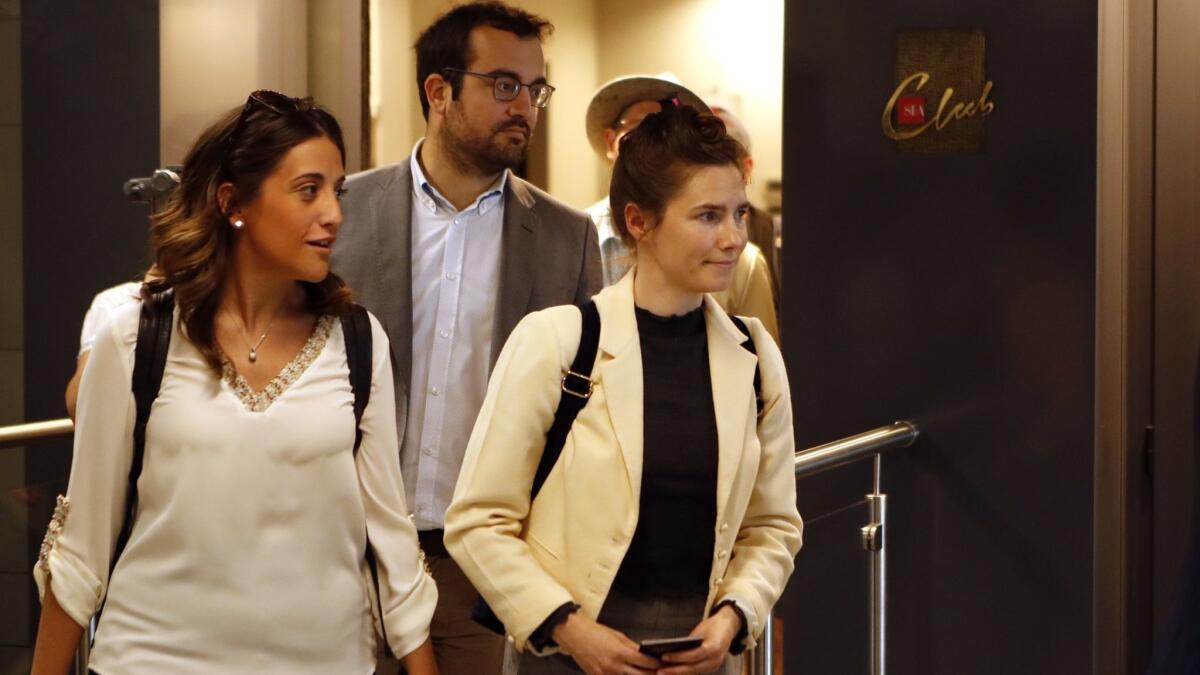Acquitted Amanda Knox back in Italy for wrongful-conviction talk

- Share via
Reporting from MILAN, Italy — Amanda Knox, a former American exchange student who became the focus of a sensational murder case, arrived Thursday in Italy for the first time since an appeals court acquitted her in 2011 in the slaying of her British roommate.
Knox arrived at Milan’s Linate airport en route to the northern city of Modena, where she is scheduled to participate Saturday in a panel discussion on wrongful convictions.
She was accompanied by her mother and fiance, and escorted by plainclothes officers. She kept her eyes down as she exited the airport and did not respond to reporters’ questions.
The killing of Knox’s roommate, 21-year-old Meredith Kercher, in the university town of Perugia on Nov. 1, 2007, attracted global attention, especially after suspicion fell on the photogenic Knox and her boyfriend, Raffaele Sollecito.
Kercher’s nude body was found under a blanket in her locked room; investigators said her throat was slit and she had been sexually assaulted.
Knox’s October 2011 acquittal — following a lower court conviction that brought a 26-year prison sentence — was one step in the long legal process that saw multiple flip-flop rulings before she and Sollecito were definitively acquitted in 2015 by Italy’s highest court.
Knox’s slander conviction and three-year sentence for having wrongly accused a Congolese bar owner, however, remained intact.
In all, Knox spent four years in jail, including during the investigation, before her 2011 acquittal freed her to return to her native Seattle, where she has lived since. An Ivorian immigrant, Rudy Guede, is serving a 16-year murder sentence for Kercher’s slaying.
Europe’s human rights court in January ordered Italy to pay Knox $20,000 in financial damages for failures to provide adequate legal and translation assistance during her early questioning.
The European Court of Human Rights noted that Knox “had been particularly vulnerable, being a foreign young woman, 20 at the time, not having been in Italy for very long and not being fluent in Italian.”
After the decision, Knox, who has been active in raising awareness around wrongful convictions, wrote on her blog that the court’s ruling meant her slander conviction was unjust.
Before traveling to Italy, she published an essay titled “Your Content, My Life,” about the decision to accept the panel invitation from the Italy Innocence Project. She talked about the impact intense media coverage and social media amplification had on her case — and continues to have on her life.
“While on trial for a murder I didn’t commit, my prosecutor painted me as a sex-crazed femme fatale, and the media profited for years by sensationalizing an already sensational and utterly unjustified story,” Knox wrote. “It’s on us to stop making and stop consuming such irresponsible media.”
More to Read
Sign up for Essential California
The most important California stories and recommendations in your inbox every morning.
You may occasionally receive promotional content from the Los Angeles Times.










